高三英语第一轮复习教案语法三(状语从句)
- 格式:doc
- 大小:205.00 KB
- 文档页数:16


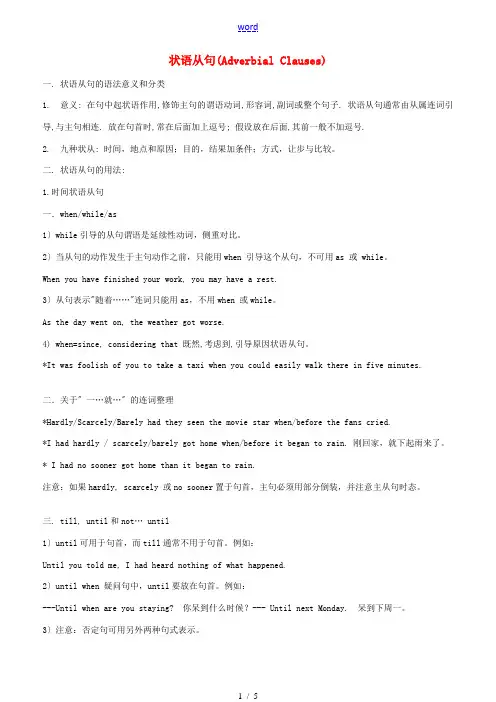
状语从句(Adverbial Clauses)一. 状语从句的语法意义和分类1. 意义: 在句中起状语作用,修饰主句的谓语动词,形容词,副词或整个句子. 状语从句通常由从属连词引导,与主句相连. 放在句首时,常在后面加上逗号; 假设放在后面,其前一般不加逗号.2. 九种状从: 时间,地点和原因;目的,结果加条件;方式,让步与比较。
二. 状语从句的用法:1.时间状语从句一.when/while/as1〕while引导的从句谓语是延续性动词,侧重对比。
2〕当从句的动作发生于主句动作之前,只能用when 引导这个从句,不可用as 或 while。
When you have finished your work, you may have a rest.3〕从句表示"随着……"连词只能用as,不用when 或while。
As the day went on, the weather got worse.4) when=since, considering that 既然,考虑到,引导原因状语从句。
*It was foolish of you to take a taxi when you could easily walk there in five minutes.二.关于〞一…就…〞的连词整理*Hardly/Scarcely/Barely had they seen the movie star when/before the fans cried.*I had hardly / scarcely/barely got home when/before it began to rain. 刚回家,就下起雨来了。
* I had no sooner got home than it began to rain.注意:如果hardly, scarcely 或no sooner置于句首,主句必须用部分倒装,并注意主从句时态。

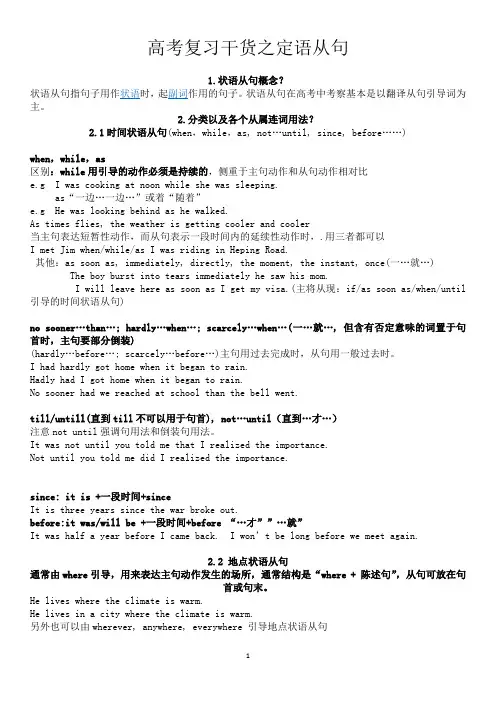
1.状语从句概念?状语从句指句子用作状语时,起副词作用的句子。
状语从句在高考中考察基本是以翻译从句引导词为主。
2.分类以及各个从属连词用法?2.1时间状语从句(when,while,as, no t…until, since,before……)when,while,as区别:while用引导的动作必须是持续的,侧重于主句动作和从句动作相对比e.g I was cooking at noon while she was sleeping.as“一边…一边…”或着“随着”e.g He was looking behind as he walked.As times flies, the weather is getting cooler and cooler当主句表达短暂性动作,而从句表示一段时间内的延续性动作时,.用三者都可以I met Jim when/while/as I was riding in Heping Road.其他:as soon as, immediately, directly, the moment, the instant, once(一…就…)The boy burst into tears immediately he saw his mom.I will leave here as soon as I get my visa.(主将从现:if/as soon as/when/until 引导的时间状语从句)no sooner…than…; hardly…when…; scarcely…when…(一…就…, 但含有否定意味的词置于句首时,主句要部分倒装)(hardly…before…; scarcely…before…)主句用过去完成时,从句用一般过去时。
I had hardly got home when it began to rain.Hadly had I got home when it began to rain.No sooner had we reached at school than the bell went.till/untill(直到till不可以用于句首), not…until(直到…才…)注意not until强调句用法和倒装句用法。

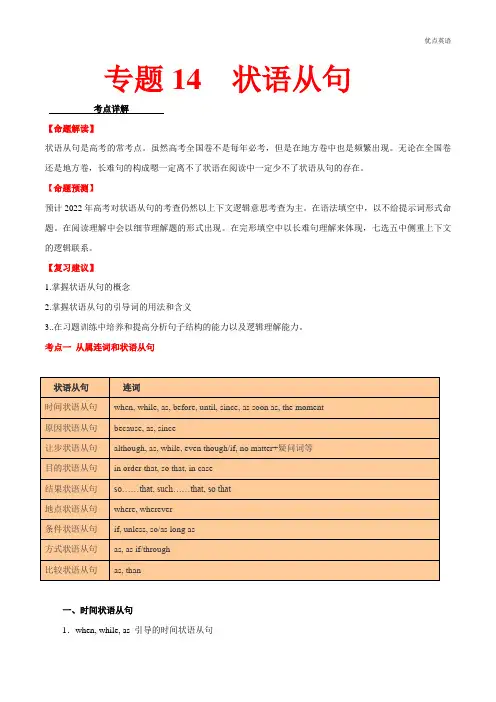
专题14 状语从句考点详解【命题解读】状语从句是高考的常考点。
虽然高考全国卷不是每年必考,但是在地方卷中也是频繁出现。
无论在全国卷还是地方卷,长难句的构成嗯一定离不了状语在阅读中一定少不了状语从句的存在。
【命题预测】预计2022年高考对状语从句的考查仍然以上下文逻辑意思考查为主。
在语法填空中,以不给提示词形式命题。
在阅读理解中会以细节理解题的形式出现。
在完形填空中以长难句理解来体现,七选五中侧重上下文的逻辑联系。
【复习建议】1.掌握状语从句的概念2.掌握状语从句的引导词的用法和含义3..在习题训练中培养和提高分析句子结构的能力以及逻辑理解能力。
考点一从属连词和状语从句状语从句连词时间状语从句when, while, as, before, until, since, as soon as, the moment原因状语从句because, as, since让步状语从句although, as, while, even though/if, no matter+疑问词等目的状语从句in order that, so that, in case结果状语从句so……that, such……that, so that地点状语从句where, wherever条件状语从句if, unless, so/as long as方式状语从句as, as if/through比较状语从句as, than一、时间状语从句1.when, while, as 引导的时间状语从句(1)when 表示“当……时;在……期间”。
①When I was a little boy, I used to climb mountains on Sundays.当我小时候时,星期天常常去爬山。
(2)while 表示“在……期间”,从句中常用延续性动词。
②Please don't talk so loud while others are studying.在别人学习的时候,请别这么大声音说话。
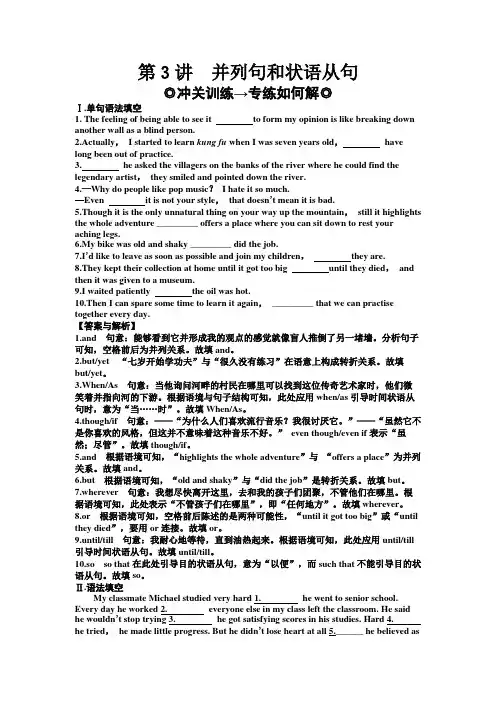
第3讲并列句和状语从句◎冲关训练→专练如何解◎Ⅰ.单句语法填空1. The feeling of being able to see it to form my opinion is like breaking down another wall as a blind person.2.Actually,I started to learn kung fu when I was seven years old,have long been out of practice.3.he asked the villagers on the banks of the river where he could find the legendary artist,they smiled and pointed down the river.4.—Why do people like pop music?I hate it so much.—Even it is not your style,that doesn’t mean it is bad.5.Though it is the only unnatural thing on your way up the mountain,still it highlights the whole adventure _________ offers a place where you can sit down to rest your aching legs.6.My bike was old and shaky _________ did the job.7.I’d like to leave as soon as possible and join my children,they are.8.They kept their collection at home until it got too big until they died,and then it was given to a museum.9.I waited patiently the oil was hot.10.Then I can spare some time to learn it again,_________ that we can practise together every day.【答案与解析】1.and句意:能够看到它并形成我的观点的感觉就像盲人推倒了另一堵墙。
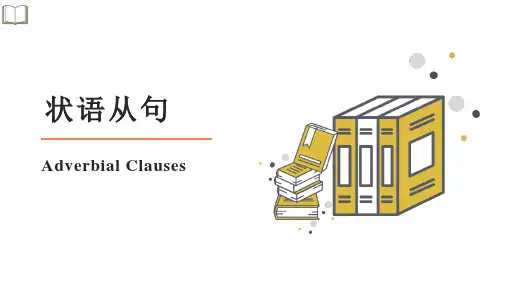

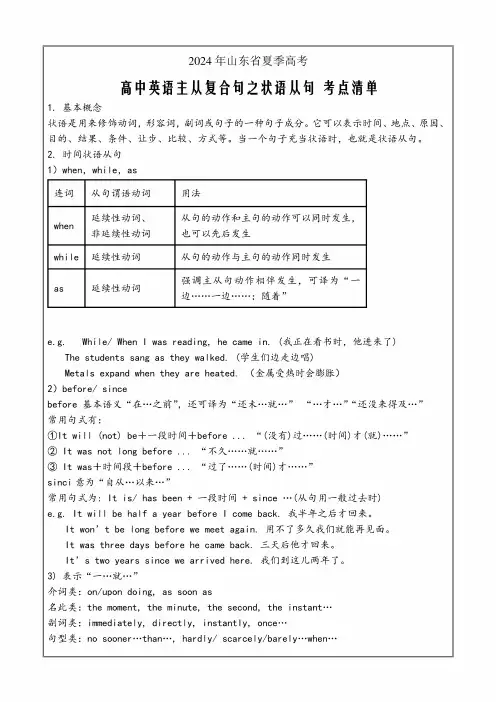
2024年山东省夏季高考高中英语主从复合句之状语从句考点清单1.基本概念状语是用来修饰动词,形容词,副词或句子的一种句子成分。
它可以表示时间、地点、原因、目的、结果、条件、让步、比较、方式等。
当一个句子充当状语时,也就是状语从句。
2.时间状语从句1)when,whiIe,as连词从句谓语动词用法when 延续性动词、非延续性动词从句的动作和主句的动作可以同时发生,也可以先后发生while延续性动词从句的动作与主句的动作同时发生as延续性动词强调主从句动作相伴发生,可译为“一边……一边……;随着”e.g.While/When I was read i ng,he came i n.(我正在看书时,他进来了)The students sang as they wa I ked.(学生们边走边唱)Meta I s expand when they are heated.(金属受热时会膨胀)2)before/sineebefore基本语义“在…之前",还可译为"还未…就…”"…才…”"还没来得及…"常用句式有:①It wi I I(not)be---段时间+before...“(没有)过....(时间)才(就)....."②It was not Iong before...“不久...就...."③It was+时间段+before...“过了...(时间)才...."s i nc i意为“自从以来…"常用句式为:It is/has been+一段时间+sinee…(从句用一般过去时)e.g.It will be half a year before I come back.我半年之后才回来。
It won't be Iong before we meet again.用不了多久我们就能再见面。
It was three days before he came back.三天后他才回来。
高三英语语法专题复习之状语从句教材内容分析本课是进行高三英语语法的复习,我在教学中将语法知识的传授和语言基本技能的学习结合到一起,注重复习语法与语言的运用。
采用任务型教学法和小组合作探究学习法,从而扩大课堂的语言输入量及学生的语言输出量。
教学目标1、知识与技能引导学生准确把握非状语从句的使用。
根据该语法规律解决实际问题。
在运用语言的过程中培养学生的观察力、分析力、想象力和自学能力,帮助学生加强记忆力,提高思维能力和运用英语的综合能力,激发创造能力。
2、过程与方法以学生为主体,尝试创新思维,联系社会采用讨论、协作、探究、竞争的教学模式,引导学生灵活运用所学语法知识3、情感、态度的价值观。
用状语从句的句子结构表达思想感情和正确的世界观、人生观。
形成健全的情感态度,为未来发展和终身学习奠定好的基础。
教学重难点1)教学重点:了解和掌握状语从句的使用。
2)教学难点:能够运用此语法规则完成各种练习训练,并在实际语言活动中灵活运用。
一.状语从句的定义:在复合句中由从句表示的状语称作状语从句,它可以用来修饰谓语(包括非谓语动词)、定语或状语,或是整个句子。
状语从句通常由一个连词引起,也可以由一个起连词作用的词组引起,有时甚至不需要连词直接和主句连接起来。
状语从句一般分为九大类时间状语从句地点状语从句原因状语从句目的状语从句结果状语从句条件状语从句方式状语从句比较状语从句让步状语从句二.状语从句的分类:1.时间状语从句:在时间状语从句中,要注意时态一致,一般情况下主句是将来时的时候,从句要用一般现在时。
可以引导时间状语从句的连词很多,根据意义和主从句之间的时间关系,又可分类如下:(1)表示同时性,即主从句的谓语动作同时发生或几乎同时发生。
其连词有:when (当……的时候), while(当……的时候), as(当……的时候), once(一旦……)as soon as(一……就……), the time(当……的时刻), the moment(当……的时刻), by the time(到……时候为止), next time(下次), the first time(第一次……的时候), the last time(上次……的时候),immediately(一……就……), instantly(一……就……),directly(一……就……)以下关联词引起的句子中,前面常用过去完成时,后面用一般过去时hardly /scarcely…when…(刚……就……), no sooner…than…(刚……就……)Strike while the iron is hot.趁热打铁。
第2讲并列句和状语从句[全国卷考情分析]题型典题试做命题解读语法填空1.(2019·全国卷Ⅱ) I work notbecause I have to, but because Iwant to.2.(2016·全国卷Ⅲ)In much of Asia,especially the socalled “rice bowl”cultures of China,Japan,Korea,andVietnam,food is usually eaten withchopsticks.3.(2016·全国卷Ⅲ)Over time,as/when the population grew,peoplebegan cutting food into small piecesso it would cook more quickly.1.并列连词(考查的重点:and,but,or,so,when,while);2.状语从句的引导词。
短文改错1.(2019·全国卷Ⅰ) Suddenly afootball fell just in front of me butalmost hit me.but→and2.(2019·全国卷Ⅱ) When I studiedchemistry at high school, Ireconsidered my goal or decided to bea doctor.or→and3.(2018·全国卷Ⅰ) At the end of ourtrip, I told my father that I plannedto return every two years, but heagreed.but→and1.并列连词的错用或缺失;2.状语从句连接词的错用;3.并列连词和状语从句的连接词的同时使用错误。
考点一并列连词Ⅰ.单句语法填空1.(2019·河北衡水中学调研)She didn't know anything about current TV shows fashion trends.or[句意:她对于当前的电视节目和流行趋势一无所知。
状语从句一.状语从句的定义:在复合句中由从句表示的状语称作状语从句,它可以用来修饰谓语(包括非谓语动词)、定语或状语,或是整个句子。
状语从句通常由一个连词引起,也可以由一个起连词作用的词组引起,有时甚至不需要连词直接和主句连接起来。
状语从句一般分为九大类时间状语从句地点状语从句原因状语从句目的状语从句结果状语从句条件状语从句方式状语从句比较状语从句让步状语从句二.状语从句的分类:在时间状语从句中,要注意时态一致,一般情况下主句是将来时的时候,从句要用一般现在时。
可以引导时间状语从句的连词很多,根据意义和主从句之间的时间关系,又可分类如下:(1)表示同时性,即主从句的谓语动作同时发生或几乎同时发生。
其连词有:when (当……的时候), while(当……的时候), as(当……的时候), once(一旦……)as soon as(一……就……), the time(当……的时刻), the moment(当……的时刻),by the time(到……时候为止), next time(下次), the first time(第一次……的时候), the last time(上次……的时候),immediately(一……就……), instantly(一……就……),directly (一……就……)以下关联词引起的句子中,前面常用过去完成时,后面用一般过去时hardly /scarcely…when…(刚……就……), no sooner…than…(刚……就……)Strike while the iron is hot.趁热打铁。
While I am washing the floor, you can be cleaning the windows.(while含有对比的意思)我洗地板的时候,你可以擦窗户。
As / When I came home, I met an old schoolmate of mine.我回家的时候遇到了我的一位老同学。
I’ll rin g you up as soon as I get an answer from him.我一有他的答复就给你打电话。
Once you see him, you will never forget him. 你一旦见过他,就不会忘了他的。
Hardly had we got into the country when it began to rain. 我们一到乡下就开始下雨了。
= We had hardly got into the country when it began to rain.No sooner had he come home than she started complaining. 他一到家她就开始抱怨。
= He had no sooner come home than she started complaining.He made for the door directly he heard the knock. 他一听到敲门声就向门口走去。
She rushed into the room immediately / the moment she heard the noise.她一听到声音就冲进房间He left me a good impression the first time I met him.我第一次见他时,他给我留下了好印象。
He had no sooner arrived there than he fell ill.他刚到达那里就生起病来。
He had hardly finished when someone rose to refute his points.他还没说完就有人起来反驳他的论点She had scarcely fallen asleep when a knock at the door awakened her.她刚要睡着,忽然敲门的声音把她惊醒。
★as、when、while用法一览表(2)表示先时或后时,即主句的谓语动作发生在从句之前或之后。
主要连词有:after(在……之后,before(在……之前), when(=after)等。
如:After / When the children had gone to bed, she began to prepare her lessons.孩子睡觉了以后她开始备课。
(从句的动作发生在主句的动作之前,所以从句用了过去完成时)He had learned English for three years before he went to London. 他去伦敦之前已学了三年英语。
(主句的动作发生在从句的动作之前,所以主句用了过去完成时)常用句型:It is/was/will be …before…要过多久才…It will be another five days before we finish this task. 还要再过5天我们才能完成这个任务。
It isn’t/ wasn’t/won’t be …before…没有过多久就…It was not long before I forgot it all. 我没有过多久就全忘了。
He ran off before I could stop him.(主句和从句的动作几乎同时发生,时态一致)我还没来得及阻止他他就跑掉了。
(注意before在汉语中的译义)(3)表示习惯性、经常性,即从句描述的不是一次性动作,而是经常发生的习惯性动作。
主要连词有every time(每次), each time(每次), whenever(每当)等。
Whenever we met with difficulties, they came to help us.每当我们遇上困难的时候他们就来帮我们Each time he came to town he would visit our school.他每次进城,总要来看看我们的学校。
Every time I went to his house, he was out.我每次去他家,他都出去了。
(4)表示持续性或瞬间性主要连词有:since(自从),ever since(自从),until(直到……才/为止,till(直到……才/为止)常用句型: It is /was…since…It is just a week since we arrived here.我们到这儿刚刚一星期。
(主句的动作或状态持续时间较短,不能用ever since)You have been reading to me ever since James went out. 自从James走后你一直在给我朗读。
(ever 放在since之前是用来表示说话者强调主句动作或状态持续时间长)The big clock which used to strike the hours day and night was damaged during the war and has been silent ever since.( ever since可以放在句末,since则不能)这只一向日夜不停打点报时的大钟在战争中损坏了,从此就一直不响了。
My uncle went to Tibet in 1951. He has been living there ever since.我叔叔于1951年去了西藏,从那以后他一直生活在那里。
Things went well until / till one night an accident happened.事情一切正常直到一天晚上发生意外I knew nothing about it until / till he told me. 他告诉我了我才知道。
★until与till及not…until / till的用法①until和till都可表示“直到......为止”,与持续性动词的肯定式连用。
如:He waited until / till we finished our meal.他一直等到我们吃完饭。
②当until和till表示“直到......才......”时,通常与短暂动词的否定式连用,这时,until和till也可用before代替。
如:I di dn’t leave u ntil / till / before she came back.直到她回来,我才离开的。
③be动词的肯定式和否定式都可以和until或till连用。
④until引导的从句可以放在主句之前或主句之后,但till从句一般不放在句首。
如:Until he told me, I knew nothing about it.他告诉我了我才知道。
当not until位于句首时,主句中的主语、谓语要使用倒装语序:Not until she came back did I leave. = I didn’t leave u ntil she came back.在强调句型中一般用until,不用till。
如:It was not until she took off her dark glasses that I realized she was a famous film star.地点状语从句是由where(在……的地方), wherever(无论哪里)引导的:Wuhan lies where the Yangtze and the Han River meet.武汉位于长江和汉水汇合处。
Where there is a will, there is a way.有志者,事竟成。
You’d better make a mark where you have any questions.(这里where引导的从句不是定语从句) 哪儿有问题,你最好在哪儿做个记号。
He would keep in touch with us wherever he was.他无论在什么地方,总是与我们保持联系。
表示原因的状语从句可以由as(由于),because(因为), since(既然),now (that) (既然), for (由于)considering that(顾及到), seeing that(由于)等连词引导:I do it because I like it.因为我喜欢我才干。
(because不能与so连用)He co uldn’t hav e seen me, because I was not there.他不可能见过我,因为当时我不在那儿。